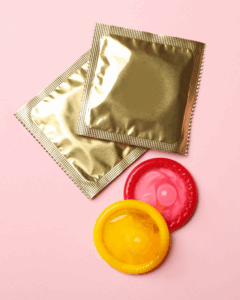- Abstinence
- Contraceptive Implant (Nexplanon)
- Contraceptive Sponge
- Fertility Awareness Based Methods (FAM)
- Lactational Amenorrhea Method (LAM)
- Spermicide
- Tubal Ligation/Sterilization
- Vasectomy/Sterilization
- Cervical Cap
- Condoms
- Contraceptive (Birth Control) Injection (DMPA, Depo-Provera)
- Withdrawal (Pulling Out)
- Contraceptive Patch
- Contraceptive Ring
- Diaphragm
- Emergency Contraception
- Intrauterine Contraception (Intrauterine Device (IUD) & Intrauterine system (IUS)
- Oral Contraceptive Pill, Birth Control Pill (“The Pill”)
Condoms
Why use a condom?
 Condoms prevent the exchange of body fluids and reduce the risk of unintended pregnancy and the spread of sexually transmitted and blood-borne infections (STBBIs).
Condoms prevent the exchange of body fluids and reduce the risk of unintended pregnancy and the spread of sexually transmitted and blood-borne infections (STBBIs).
Using a condom or oral dam (dental dam) during vaginal, anal, or oral sex can prevent most STBBIs.
Condoms are available at local pharmacies, grocery stores, or convenience stores without a prescription.
Using condoms is a good way to show trust, respect, and confidence between you and your partner(s).
Types of Condoms:
External condom (click to expand) »External condoms are worn over the penis or sex toy during vaginal, anal, or oral sex and are available in a variety of sizes, textures, and colours/flavours. There are three types of external condoms:
Natural condoms do not protect against STBBIs. Use a latex or synthetic condom to reduce the risk of an STBBI. How effective are external condoms?
Check out this Infographic from Sex & U for more information. |
Internal condom (click to expand) »Internal condoms are inserted into the vagina or anus. These types of condoms are much larger than external condoms and pre-lubricated. How effective are internal condoms?
Check out this Infographic from Sex & U for more information. |
Oral (dental) dams (click to expand) »Oral (dental) dams provide a barrier between the mouth, vagina, penis, or anus during oral sex. If an oral dam is unavailable, they can easily be made from a condom by rolling it out, cutting off the top and the ring, and then cutting along the length to form a rectangle. Use a water-based lubricant on the genital area to help keep the oral (dental) dam in place. How effective are oral (dental) dams?
For more information visit, Planned Parenthood NL Sexual Health Centre. |
All condoms should be applied before any skin-to-skin genital contact.
What if I am allergic or sensitive to latex?
Non-latex condoms and oral dams (dental dams) are available and equally effective in preventing pregnancy and STBBIs.
What is dual protection?
Dual protection is combining condoms with another form of birth control to prevent an unintended pregnancy.
Things to consider:
- Keep condoms and/or oral (dental) dams in a cool, dry place away from direct sunlight and heat.
- Never fold a condom or store in an area that could cause rubbing.
- Have more than one condom and/or oral (dental) dam on hand in case one is damaged or expired.
- Check the expiry date and inspect the package for any damage before use.
- Open the condom and/or oral (dental) dam package carefully; avoid using teeth, scissors, fingernails, or anything sharp.
- Never use two condoms at the same time. It can increase the risk of tearing the condom.
- Use a water-based lubricant with latex condoms and/or oral (dental) dams; oil-based products like Vaseline can damage latex condoms and/or oral (dental) dams.
- Use a new condom and/or oral (dental) dam each time you have sex.
What if the condom breaks or falls off?
Emergency contraception (EC) also known as the “morning-after pill” can prevent an unintended pregnancy after unprotected intercourse or when a contraceptive method has failed.
Get tested for STBBIs to prevent any health issues.
Ask your health-care provider for more information.
Amaze Videos
Services related to this information:
- Contact Planned Parenthood — NL Sexual Health Centre at 1-877 NO MYTHS (666-9847) or 709-579-1009
- Contact your Public Health Nurse.
- 811 HealthLine (Newfoundland & Labrador) – Call 811 or 1-888-709-2929 / TTY 1-888-709-3555
Eastern-Urban:
- Contact the Sexual Health Clinic at sexualhealthclinic@easternhealth.ca.
- Contact the community walk-in clinic (Mundy Pond) at 709-777-1706
